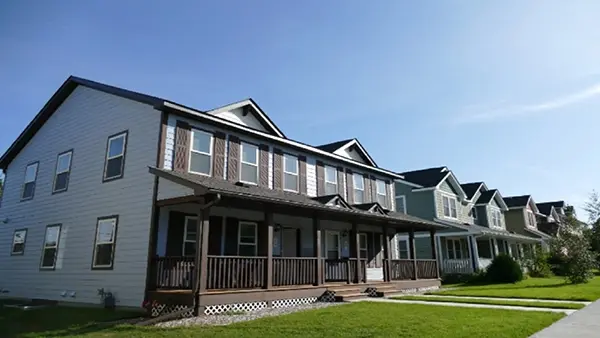Finding the perfect neighborhood for your family can feel overwhelming, especially when you're balancing tight budgets, work responsibilities, and children's needs. Whether you're a single parent, caring for multiple generations, or simply trying to create the best home for your loved ones, the search can be both exciting and anxiety-producing.
Take a deep breath—we're here to help you through this.
You’ve likely considered the amenities you want in your first home and you probably have an idea of what city/region you want to live in, but there’s more to it than that. Even if you have a general location in mind, it’s important to dig deeper into the different areas of any city. If you're grappling with what to look for in a neighborhood, here are some crucial factors to contemplate while scouting for your dream location.
1. Neighborhood Safety
When it comes to creating a home, few things matter more than feeling secure in your surroundings. This is especially true for families with children or individuals living alone. While no neighborhood is completely problem-free, understanding the safety profile of an area you're considering can provide valuable peace of mind.
Here are some things you can look into to help you get a better sense of whether or not a neighborhood feels safe:
- Crime statistics: Every area will have some criminal activity from time to time, so don’t be discouraged if you can't find a completely crime-free area. There are plenty of reputable online resources to check crime maps, but the most accurate data will likely come from the criminal reports on the city’s website or directly from local law enforcement. Also, consider how things might change based on seasonality. For example, if you are house hunting in the winter, the month-over-month report for the colder months may be different than what it is over the summer when there are events and activities bringing more people to the area.
- Neighborhood watch: If it’s important to you, find out if there is a neighborhood watch group established in the area. Ask local law enforcement or one of the residents. You might also see a street sign indicating it is a neighborhood watch area.
- Street lighting: Adequate street lighting can help many people feel safer in a neighborhood.
- Talk with neighbors: If you see someone walking their dog, mowing the lawn, or just grabbing their mail, introduce yourself by telling them you may be interested in moving to the neighborhood. Residents can tell you firsthand whether or not they feel the area is safe.
- Safety considerations for solo parents: If you're a single parent, safety takes on additional dimensions. Consider evaluating emergency response times in the area, proximity to trusted neighbors who could help in a pinch, and the availability of well-lit parking close to potential homes. Many single parents find that neighborhoods with active community involvement tend to offer additional "eyes on the street" that create an informal support network. Look for areas where neighbors know each other by name and watch out for each other's children.
Of course, these aren’t the only ways to determine the safety of a neighborhood, and you should always trust your instincts. If it doesn’t feel right, keep searching for the neighborhood that makes you feel secure.
2. Nearby Necessities
Food, medications, and toiletries are necessities for daily life. If convenience is important to you, you may want to consider choosing a location that’s close to where you will be running a majority of your errands.
Map out where the neighborhood is in relation to the nearest pharmacy, grocery, and department stores. Are they conveniently close, or will your trip to the store require more time or effort? If these stores are not necessarily close to your home but are on your way to/from work, school, or daycare, that is also something that may factor into your decision.
For busy families, especially those headed by single parents, consider the proximity of these additional necessities:
- Affordable childcare: Look into nearby daycare centers, preschools, and after-school programs. Visit facilities, check their hours of operation (including early drop-off and late pick-up options), and ask about their emergency closure policies.
- Healthcare facilities: Is there a pediatrician, urgent care, or hospital within a reasonable distance? For families managing chronic health conditions, proximity to specialists might be particularly important.
- Convenience services: Check if the area has services that can make life easier, such as grocery delivery, laundry services, or meal preparation businesses that can help during especially busy times.
3. School District
Whether you're planning to have kids in the near future, you just had your first child, or you have a few youngsters in school already, finding a well-performing school district is something many families prioritize when looking for the right location to live.
For parents, few neighborhood factors carry more weight than the quality of local schools. Not only do schools directly impact children's educational opportunities, but they often serve as community hubs and significantly impact home values. Looking beyond simple ratings to find the right educational fit for your unique child can be challenging but tremendously rewarding.
How do you determine if a school district is "good" or not?
- Test scores and data: State test scores can be an indicator of whether a certain school district is performing at, below, or above the state average. Minnesota Report Card provides graduation rates, MCA and MTA test scores, and information about access for English language learners, demographics, and more.
- Beyond test scores: Consider teacher-to-student ratios, staff turnover rates, and special education services. Visit during school hours to observe classroom dynamics and speak with current parents about their experiences.
- Programming: School programming can be a big deal for some families. If the adults in the house work full time during the day, after-school programs can be a big help in the few hours after school before the workday ends. For families with children who have special needs, it is very important to choose a district that has the resources to give them proper accommodations, extra support, etc. If your student does well in many classes, you may want to see if the district you're considering offers Advanced Placement (AP) classes or college-level courses that can go toward continued education after high school.
- Extracurricular activities: Maybe your child loves writing or performing in musicals. Does the school have a newspaper? What about a science/math/art/book club? Finding a district that caters to your children's interests and strengths will help toward their success.
- Sports programs: Maybe you assume all school districts offer high school football, have a swimming team, and are competitive in lacrosse. But maybe the district you're looking into is too small or lacks the funding to support specific sports. Double-check to see what athletic programs are offered.
- PTO: If open parent and teacher communication and cooperation is important to you, ask about its Parent Teacher Organization or Association (PTO/PTA). Is there one? How many people actively participate? How often do they meet? What types of topics are discussed when they do meet? Is it an open and welcoming group?
- Single-parent support: Look for schools offering flexible conference scheduling, multiple communication channels, inclusive family events, homework support during after-school programs, and emergency care options.
4. Nearby Parks, Walking Paths, or Dog Parks

Access to outdoor spaces enhances wellbeing for everyone, providing places for exercise, play, stress relief, and connecting with neighbors. Even if you’re looking to buy a home during the winter season, it is still important to check out the outdoor amenities a neighborhood has to offer.
You may want to consider taking a drive or walk around the area, and checking for things like:
- Sidewalks: This may seem like an obvious one, but well-maintained sidewalks make a neighborhood more accessible for people with disabilities and/or no alternative route of transportation.
- Parks: This may be important for you, your children, and even your dog. Is there one within walking distance, or is it a short drive away? What amenities does the park have? If it's not something you would visit, it might not matter, or it might deter you from buying a house in that neighborhood.
- Walking trails: Maybe you take your dog for a walk every morning before you go to work, or you enjoy a family stroll after dinner. Look around for nearby walking trails or locate a city trail map.
- Extended family gatherings: If your family regularly hosts large gatherings, look for neighborhoods with homes featuring adequate indoor/outdoor spaces, sufficient visitor parking, and community spaces that can be reserved for celebrations. Parks with pavilions or picnic areas can provide affordable alternatives for family events.
5. Commute to Work
As gas prices continue to climb, many people would greatly appreciate a shorter commute. Finding a manageable route between work and family responsibilities is so important.
Pay attention to the routes you can take to get there–just because the distance is shorter in mileage does not necessarily mean it will take less time with traffic and construction. If driving yourself isn’t an option, or one you prefer to avoid, look into transportation options such as metro transit buses, light rail, and cycling routes.
For families, take a look at these transportation considerations:
- School-to-work logistics: For parents juggling work and school drop-offs/pick-ups, consider the full transportation loop from home to school to work and back. Is this manageable daily?
- Public transportation reliability: If you'll rely on public transit, research actual reliability (not just scheduled service) and contingency options for when systems experience delays.
- Carpool potential: Are there neighbors or coworkers nearby with whom you might share driving responsibilities?
- Walking and biking safety: For older children who might transport themselves to school or activities, evaluate the safety of walking and biking routes.
- Emergency transportation: How would you handle transportation during unexpected situations, such as a child's illness during the workday?
6. Activities in the Area
Aside from the necessities you need to survive, does your potential new neighborhood have what you need to thrive? If you’re someone who enjoys going out or getting takeout, scope out the nearby restaurant scene. If you enjoy spin classes or yoga, check to see if there’s a gym or studio nearby. If you’re a big reader, see if there’s a library or bookstore close by.
Here are more cultural amenities and community diversity options to look out for:
- Cultural resources: Look for neighborhoods with access to museums, libraries, community centers, and arts programs that align with your family's interests and cultural background.
- Community diversity: Research the neighborhood's demographic makeup. Diverse communities often provide rich learning environments for children and opportunities for broader social connections.
- Cultural and religious institutions: If maintaining connections to specific cultural practices or religious services is important to your family, identify neighborhoods with accessible resources that support these needs.
- Community events: Areas with regular community gatherings—festivals, farmers markets, holiday celebrations—often provide opportunities for meaningful social connections without significant financial investment.
- Language resources: For multilingual families or those hoping to maintain heritage languages, look for communities where those languages are spoken and which resources (like bilingual programs) are available.
Single-Parent Support Networks
The right support network can transform the solo parenting experience from overwhelming to manageable. When looking at potential neighborhoods, consider these resources valuable to single-parent families:
- Community support groups: Look for established single-parent groups, parenting classes, and family resource centers where you can connect with others in similar situations.
- Childcare collaboratives: Some neighborhoods have formal or informal childcare exchanges where parents take turns watching each other's children, making after-school coverage more affordable.
- Family-friendly scheduling: Check if local businesses, healthcare providers, and government services offer extended hours that accommodate working parents' schedules.
- Emergency backup systems: Identify neighborhoods where neighbors know and support each other, creating natural emergency childcare options.
- Resource accessibility: Consider proximity to services like affordable legal aid, financial assistance programs, and career development resources that specifically support single parents.
- Inclusive community events: Look for areas that host family activities designed to include all family structures, not just traditional two-parent households.
- Online neighborhood groups: Many communities maintain active social media groups where parents share resources, hand-me-downs, and childcare recommendations.
Other Things to Remember
The same features that make a neighborhood desirable can also raise the demand for (and prices of) homes in that area. If this happens to you while searching for a home, you may need to take a step back and rethink your approach. Prioritizing your "must-haves'' during your home search will make the decision process much easier down the road. You should also work with your realtor and get an idea of how competitive the housing market is in that area. Are people waiting months, a year, or even more to buy homes in that community?
It's helpful to determine whether you love the house or the neighborhood. If it’s the neighborhood you love, and the house price is too high, you have a few options. First, you can try to find a smaller home in the area that you can afford. If that's not an option, you can also go back to your "must-haves" list and see if there are any amenities/finishes/etc. that you're willing to give up to find a home in that neighborhood.
If it’s the home you love, understand that you can pay the same amount for very different houses depending on the community you’re looking in. Try to identify what it is you love about the house. Chances are, there's a home in a neighborhood nearby that’s less expensive, but has a similar neighborhood feel and community amenities.
Remember to take your time searching and don't be afraid to drive around the area, talk to neighbors, and ask questions. You want to be comfortable when making a big decision like where to buy a house, and you want to be confident in your choice. Make sure to have honest, open conversations with people you trust during the homebuying process such as family members, your realtor, or a financial coach. They can help set realistic expectations and offer advice and opinions when you're making a decision.

 Twin Cities Habitat for Humanity
:
12:54 PM on May 8, 2025
Twin Cities Habitat for Humanity
:
12:54 PM on May 8, 2025




